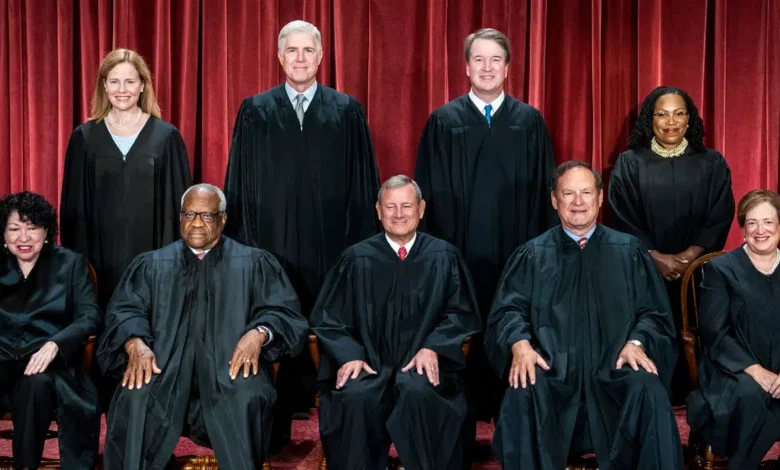Former Supreme Court Justice David Souter Dies At 85

Former Supreme Court Justice David Souter, a Republican appointee who resigned in 2009 after routinely siding with the court’s liberal side, died on Friday, the court confirmed. He was 85 years old.
Souter, a low-key New Englander who avoided the national spotlight, was dubbed the “stealth nominee” when President George H.W. Bush nominated him in 1990 to succeed liberal icon William Brennan. Advisers persuaded the president that Souter would pull the court to the right, a misinterpretation that still resonates today.
The Supreme Court stated that Souter died on Thursday.
Read more: Jesse Watters Stops Show After Jessica Tarlov Makes SICK Trump Comment
“Justice David Souter served our court with great distinction for nearly twenty years,” Chief Justice John Roberts said in a statement. “He brought uncommon wisdom and kindness to a lifetime of public service.”
Those who knew Souter said his approach to the law was measured, intellectual, and consistent with the concept of judicial restraint.
“The whole point of it was that it was a Constitution and a Bill of Rights for the indefinite future,” Souter said during a 2012 event. “The application of these values, the problem of trying to make them work in practice, was an assignment that was left to the future.”
Former Supreme Court Justice David Souter dead at 85 https://t.co/zBZjafEKxM pic.twitter.com/1eadPD85x5
— New York Post (@nypost) May 9, 2025
Read more: Michelle Obama Takes Jab at Barack Over His Behavior In The Bedroom
Conservatives quickly came to regret Souter’s appointment.
After less than two years on the court, he contributed to an important ruling that reaffirmed the core principle of Roe v. Wade, namely that the right to abortion was implicitly protected by the Constitution. He would later agree with the court’s liberal bulk in decisions involving civil rights, affirmative action, and voting.
His term sparked a rallying cry on the right – “No More Souters” – and resulted in more severe ideological vetting of nominees. Subsequent nominees from both parties, including today’s justices, are less likely to disagree with the party that appointed them.
Read more: Uh Oh: Barack Obama Video Goes Viral Amid Divorce Rumors
In 1995, Souter issued a widely publicized unanimous First Amendment judgment allowing organizers of a St. Patrick’s Day parade in Boston to deny a spot to an LGBTQ group. A decade later, he argued for a 5-4 decision declaring that three counties in Kentucky violated the Frist Amendment by displaying framed reproductions of the Ten Commandments in courthouses and public schools.
“The divisiveness of religion in current public life is inescapable,” Souter wrote. “This is no time to deny the prudence of understanding the establishment clause to require the government to stay neutral on religious belief, which is reserved for the conscience of the individual.”
He frequently expressed his opinions modestly. In a 2009 concurrence in a case involving Navajo Nation mineral rights, Souter put down only two sentences.
Read more: Supreme Court Shocker – Trump Wins Big In Stunning Decision
“I am not through regretting that my position” in an early case “did not carry the day,” he wrote. “But it did not, and I agree that the precedent of that case calls for the result reached here.”
In another departure from current conventions, Souter resigned after 19 years on the Supreme Court, intending to return to his quiet life in New Hampshire. Souter, who had never married and was never fond of the Washington social scene, retired at the age of 69, significantly younger than most leaving justices.
His departure offered President Barack Obama, a Democrat, his first opportunity to choose a Supreme Court justice.
Read more: Leaked Video Of Nancy Pelosi Shakes DC – Is She Okay???
Obama nominated Sonia Sotomayor, a self-described “fiery Latina,” to replace the low-key New England native Souter. Sotomayor is now the senior member of the court’s three-justice liberal faction.
Souter, content to leave Washington’s politics and agitation behind, spent his retirement in New Hampshire, frequently sitting on lesser courts to fill vacancies as needed.
His desire for a peaceful existence was clear throughout his tenure on the Supreme Court, when he avoided technology and penned his judgments in longhand. When asked if there would ever be cameras in the courtroom, he famously said, “Over my dead body.”
Read more: Trump DEFIES ‘Deep State – Makes Stunning Late – Night Move No One Expected




